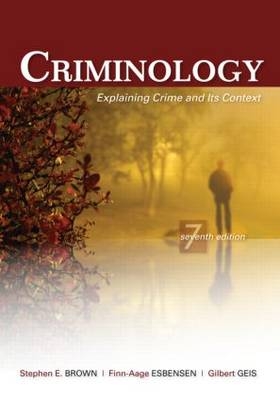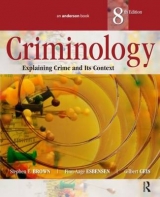
Criminology
Anderson Publishing (Verlag)
978-1-4224-6332-1 (ISBN)
- Titel erscheint in neuer Auflage
- Artikel merken
Criminologists can benefit from questioning the underlying assumptions upon which they rest their work. Philosophy has the ability to clarify our thoughts, inform us of why we think about things the way we do, solve contradictions in our thinking we never knew existed, and even dissolve some dichotomies we thought were cast in stone. One of those dichotomies is free will vs. determinism. Criminology must reckon with both free will and agency, as posited by some theories, and determinism, as posited by others—including the ever more influential fields of genetics and biosocial criminology. Criminological Theory: Assessing Philosophical Assumptions examines philosophical concepts such as these in the context of important criminological theories or issues that are foundational but not generally considered in the literature on this topic. The uniqueness of this treatment of criminological theory is that rather than reporting what this person or that has said about a particular theory, Walsh exposes the philosophical assumptions underlying the theory. Students and scholars learn to clarify their own biases and better analyze the implications of a broad range of theories of crime and justice.
Stephen E. Brown is a Professor of Criminology & Criminal Justice and Department Head at Western Carolina University. He received the Ph.D. in Criminal Justice and Criminology from The University of Maryland in 1979. He went through the professorial ranks at East Tennessee State University, serving as Department Chair for 11 years and leaving as Professor Emeritus in 2008. Brown has published articles in a number of journals, including Criminology, Journal of Criminal Justice, Journal of Criminal Justice Education, Criminal Justice Review, Youth and Society and Social Science Quarterly. His areas of research interest have been broad, covering topics such as family violence, deterrence, delinquency, and application of statistics within criminology. He has served as a Trustee on the board of The Academy of Criminal Justice Sciences, and as editor of The American Society of Criminology's The Criminologist. He is currently working with several colleagues in assessing pedagogical challenges in teaching social science statistics. Finn-Aage Esbensen is the E. Desmond Lee Professor of Youth Crime and Violence in the Department of Criminology and Criminal Justice at the University of Missouri-St. Louis and is currently serving as Department Chair. He has held research positions at the Center for Criminal Justice at Harvard Law School; Catholic University; the Behavioral Research Institute, Boulder, Colorado; and the Institute of Behavioral Science, University of Colorado. He received both his B.A. (German and Sociology) and M.A. (Sociology) degrees from Tufts University and his Ph.D. (Sociology) from the University of Colorado, Boulder. Gilbert Geis is a Professor Emeritus in the Department of Criminology, Law, and Society at the University of California, Irvine. He is a former president of the American Society of Criminology and recipient of its Edwin H. Sutherland Award for outstanding research. He has also been given research awards by the Association of Certified Fraud Examiners, the Western Society of Criminology, the American Justice Institute, and the National Organization for Victim Assistance. Geis received his undergraduate degree from Colgate University and his Ph.D. from the University of Wisconsin. Before joining the Irvine faculty, he taught at the University of Oklahoma and California State University, Los Angeles. Geis has published more than 400 articles on various aspects of crime and criminal justice.
Part I: Foundations for Criminology 1. Crime and Criminology 2. The Relativity of Law and Crime 3. Production of Crime Statistics 4. Distribution of Crime Part II: Theories of Crime 5. Deterrence and Rational Choice Theories of Crime 6. Individual Theories of Crime: Biological and Psychological Perspectives 7. Social Structure Theories of Crime 8. Social Process Theories of Crime 9. Social Reaction Theories of Crime 10. Recent Developments in Criminological Theory Part III: Types of Crime 11. Violent Crime 12. Economic Crime 13. Crimes without Victims and Victims without Crimes
| Erscheint lt. Verlag | 25.6.2010 |
|---|---|
| Verlagsort | Cincinnati |
| Sprache | englisch |
| Themenwelt | Recht / Steuern ► Strafrecht ► Kriminologie |
| ISBN-10 | 1-4224-6332-X / 142246332X |
| ISBN-13 | 978-1-4224-6332-1 / 9781422463321 |
| Zustand | Neuware |
| Informationen gemäß Produktsicherheitsverordnung (GPSR) | |
| Haben Sie eine Frage zum Produkt? |
aus dem Bereich



